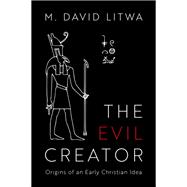M. David Litwa here examines the origins of the creator concept in early Christian biblical interpretations. His interpretation moves beyond previous attempts to root the analysis in Judaism or in a social-psychological crisis. Rather, it connects the ancient readings with Christianity today.
In Gnostic readings, ancient Egyptians' assimilation of the Jewish god to the deity Seth-Typhon is studied to understand Gnostics' reapplication to a "Judeo-catholic" creator. The Christian reception of sections in the gospel of John is shown to implicate the Judeo-catholic figure in murdering
Christ. Litwa then discusses Marcionism, where God's harmful behavior continues to be displayed. In the Second Epistle to the Corinthians, the "god of this world" blinds people from illumination. He destroys the Law and the Lawgiver. Christ also succumbs to the "curse of the Law" inflicted by God.
In both streams of biblical interpretation, it is shown how ancient readers logically concluded that the creator of this world was not simply just or cruel, but outright evil in his attempt to curse and destroy Christ.
The Evil Creator: Origins of an Early Christian Idea shows how this analysis is a product of Christian biblical exegesis and connects its ancient origins to modern theology. Litwa shows how readers of today's Christian Bible still find wickedness and how these early explications have contributed to
the atheism phenomenon.








